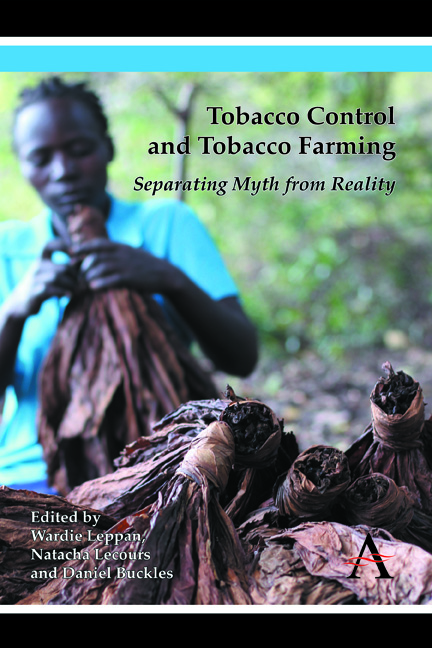Book contents
- Frontmatter
- Contents
- List of Figures, Tables and Photographs
- Foreword
- Preface
- Introduction: Separating Myth from Reality
- Section One The Determinants of Tobacco Leaf Demand
- Section Two Tobacco-Farming Conditions in Low- and Middle-Income Countries
- Section Three Economically Sustainable Alternatives to Tobacco
- Chapter 5 Breaking the Dependency on Tobacco Production: Transition Strategies for Bangladesh
- Chapter 6 Substituting Bamboo for Tobacco in South Nyanza Region, Kenya
- Chapter 7 Diversification Strategies for Tobacco Farmers: Lessons from Brazil
- Conclusion: Reframing the Debate on Tobacco Control and Tobacco Farming
- Annex: A Policy Brief on Tobacco Control and Tobacco Farming
- Contributors
Chapter 5 - Breaking the Dependency on Tobacco Production: Transition Strategies for Bangladesh
from Section Three - Economically Sustainable Alternatives to Tobacco
Published online by Cambridge University Press: 05 November 2014
- Frontmatter
- Contents
- List of Figures, Tables and Photographs
- Foreword
- Preface
- Introduction: Separating Myth from Reality
- Section One The Determinants of Tobacco Leaf Demand
- Section Two Tobacco-Farming Conditions in Low- and Middle-Income Countries
- Section Three Economically Sustainable Alternatives to Tobacco
- Chapter 5 Breaking the Dependency on Tobacco Production: Transition Strategies for Bangladesh
- Chapter 6 Substituting Bamboo for Tobacco in South Nyanza Region, Kenya
- Chapter 7 Diversification Strategies for Tobacco Farmers: Lessons from Brazil
- Conclusion: Reframing the Debate on Tobacco Control and Tobacco Farming
- Annex: A Policy Brief on Tobacco Control and Tobacco Farming
- Contributors
Summary
Introduction
Tobacco farmers in Bangladesh are, in their own way, as dependent on tobacco as smokers of the final product. Debt to the tobacco companies, and the seductive appeal of facilities they offer, bind tobacco farmers to an industrial monocrop that depletes soils, denudes forested hillsides and compromises the health of field workers, and of the women and children curing the leaves (see Lecours, this volume). Many tobacco farmers, especially older ones who have seen the impacts of tobacco growing on their families and on their lands, are desperate to shift to other crops, but feel they cannot. Local and regional markets have withered in tobacco-growing regions, locally adapted seeds for food crops are not readily available and soils are so degraded by years of tobacco cultivation that to grow any crop at all seems impossible without using massive amounts of fertilizers and pesticides. Breaking the dependency on tobacco production is not easy, and many farmers that consider it find themselves going back to the tobacco companies year after year.
The Government of Bangladesh, as a party to the World Health Organization–sponsored Framework Convention on Tobacco Control (FCTC), has indicated that it intends to help farmers shift out of tobacco production. Doing so without excessive costs to governments or hardship for farmers remains a challenge, however. The Smoking and Tobacco Products Usage (Control) Bill passed by the Bangladesh government in 2005 included provisions to support alternative crops (Article 12).
- Type
- Chapter
- Information
- Tobacco Control and Tobacco FarmingSeparating Myth from Reality, pp. 141 - 188Publisher: Anthem PressPrint publication year: 2014



